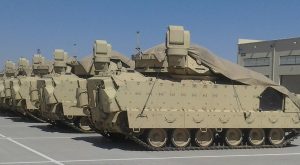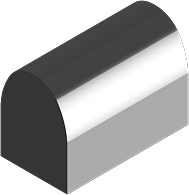Steel Aermet 100
View AMS Numbers >
Steel Aermet 100
AerMet 100 is a martensitic steel alloy characterized by ultra-high strength. The property of this alloy comes directly from the robust crystalline structure that’s a characteristic of almost every martensitic alloy. The main advantages of Steel AerMet 100 are superior fracture toughness and ductility, excellent fatigue and stress corrosion cracking resistance, and high fatigue strength. That said, Steel AerMet 100 is not a corrosion resistance alloy, which means that special care is needed for sealing the parts if they are to be used in wet environments.
Thanks to its excellent mechanical properties, AerMet 100 has widespread use in the military and aerospace applications. More precisely, it is used for manufacturing of armor, fasteners, landing gear, actuators, artillery, ballistic tolerant components, jet engine shafts, structural members, drive shafts and structural tubing. This steel alloy can be used at temperatures of up to 800°F (427°C) and possesses a minimum tensile strength of 280 ksi (1930 MPa) and a minimum toughness of 100 Ksi√ in.
AerMet 100 is considered as an upgrade to AF1410 because it has fewer restrictions and a higher combination of strength and toughness.
Apart from the outstanding mechanical properties, Steel AerMet 100 is characterized by good weldability without preheating, excellent polishability, and it can also be readily formed.
Tech Steel & Materials offers Steel AerMet 100 in two sub-type specifications and two shapes/forms:
Chemical Composition of Steel AerMet 100
| Element | min | max |
| Carbon | 0.21 | 0.25 |
| Manganese | — | 0.10 |
| Silicon | — | 0.15 |
| Phosphorus | — | 0.008 |
| Sulfur | — | 0.005 |
| Chromium | 2.90 | 3.30 |
| Cobalt | 13.00 | 14.00 |
| Molybdenum | 1.10 | 1.30 |
| Titanium | — | 0.015 |
| Aluminum | — | 0.015 |
| Oxygen | — | 0.0020 (20 ppm) |
| Nitrogen | — | 0.0015 (15 ppm) |
| Nickel | 11.00 | 12.00 |
| Iron | — | *Balance |
*Not exclusively to the element mentioned, but that one predominates other elements that are used only in minimal quantities.
Fabrication and Working Instructions
AerMet 100 can be difficult to machine at HRC 38. In order to mitigate that, carbide tools are recommended at 280 to 350 SFM. After the machining process, stress relieve at 800°F (427°C) is recommended for 1-3 hours.
Forging, on the other hand, should start at a temperature of 2250°F (1232°C) for first break down. Then, the part should be finished starting with a temperature of 1800°F (982°C) and down to 1650° F (899°C) for optimization. After the forging is finished, Steel AerMet 100 should be air cooled to room temperature, followed by annealing and normalizing in order to restore properties to the dead zone.
AerMet 100 is weldable without preheating required.
Typical mechanical properties on longitudinal orientation with heat treatment at 1625°F (885°C), one-hour air cooling to achieve -100°F (-73°C) of the previous temperature, and then aging for 5 hours at 900°F (482°C) are listed in the table below:
| Rc | UTS | Elongation | Reduction of Area | Charpy V-notch Impact Energy | FTT K |
| 53.0/54.0 | 285 ksi | 14% | 65% | 30 ft-lbs / 40.67 Nm | 115 Ksi√ in |
Mechanical Properties (Longitudinal)
| Property | Value |
| Tensile Strength | 290 ksi |
| Yield Strength at 0.2% Offset | 245 ksi |
| Elongation in 4D | 10% |
| Reduction of Area | 50% |
Mechanical Properties (Transverse)
| Property | Value |
| Tensile Strength | 290 ksi |
| Yield Strength at 0.2% Offset | 245 ksi |
| Elongation in 4D | 8% |
| Reduction of Area | 35% |
Physical Properties
| Property | Value |
| Density | 0.285 lb /in3 |
| Modulus of Elasticity | 28.2 x 103 ksi |
| Electrical Resistivity | 259.0 ohm-cir-mil/ft at 70.0°F (21°C) |
| Critical Temperature | AC1 – 1065°F (573°C) |
| AC3 – 1525°F (830°C) | |
| Mean Co of Thermal Expansion | Annealed – 6.01 x 10-6 in/in/°F |
| Heat treated – 6.08 x 10-6 in/in/°F |
Mechanical and Physical Properties at a Given Temperature
| Properties | 70°F (21.1°C) | 200°F (93.3°C) | 300°F (148.9°C) | 400°F (204.4°C) | 600°F (316.5°C) | 700°F (371.1°C) | 800°F (426.7°C) | 1000°F (537.8°C) |
| Ultimate Tensile Strength | — | 285 ksi | 270 ksi | 260 ksi | 248 ksi | 237 ksi | 229 ksi | — |
| Yield Strength at 0.2% Offset | — | 250 ksi | 240 ksi | 230 ksi | 218 ksi | 200 ksi | 192 ksi | — |
| Reduction of area | — | 55% | 62% | 64% | 63% | 61% | 60% | — |
| Elongation | — | 14% | 16% | 16% | 16% | 15% | 15% | — |
| Charpy V-notch Impact Energy | — | 50 ft-lb | 52.3 ft-lb | 50 ft-lb | 33.2 ft-lb | 28 ft-lb | 27.2 ft-lb | — |
| Modulus of Elasticity | 28.2 x 103 ksi | — | — | — | — | — | — | — |
Heat Treatment
Steel AerMet 100 is subject to decarburization during hardening like most other carbon-bearing high-strength alloys. Due to the decarburization, we recommend heat treatment in an inert atmosphere, salt bath, or vacuum. In order to determine the level of decarburization, test a small cube for differences between the internal hardness and surface hardness.
Normalizing of AerMet 100 is done at 1650°F (899°C) for one hour. Then, air-cool the part until it reaches room temperature. If optimum softening for easier machining is required, anneal the piece at 1250°F (677°C) for 16 hours. The annealed hardness achieved here is 40 HRC.
The solution treatment temperature range of AerMet 100 is 1625°F (+/-25°F) or 885° C (+/- 14°C) and lasts one hour. We recommend monitoring the temperature with a thermocouple attached.
While water quenching is not recommended with AerMet 100, cold treatment should be done in order to obtain full toughness. Cool the material to -100°F (-73°C) and hold it for one hour at that temperature.
The standard aging treatment for this alloy is at 900° F (+/-10°F) or 482°C (+/-6°C) for five hours. Aging temperatures should never fall below 875°F (468°C).
AerMet 100 doesn’t change its size during heat treatment, but for some precise parts, we recommend a low-temperature stress relief of 350-400°F (176-205°C).
Select AMS Number:
| AMS Number | Alloy | Type | UNS | Cross Ref. Spec | Misc./Shape | |
|---|---|---|---|---|---|---|
| AMS 6478 Bar | Aermet 100 | Steel | K92580 | - | Bar |
 |
| AMS 6478 Forging | Aermet 100 | Steel | K92580 | - | Forging |
 |
| AMS 6532 Bar | Aermet 100 | Steel | K92580 | - | Bar |
 |
| AMS 6532 Forging | Aermet 100 | Steel | K92580 | - | Forging |
 |

 Tech Steel & Materials
Tech Steel & Materials